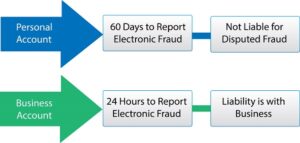
Digital Banking
Keep Windsor Federal at your fingertips to transfer funds, pay bills, deposit checks and more – anytime, anywhere.
Business owners face many challenges in today’s economy. Labor shortages and inflation make headlines daily, yet there’s one growing business issue we don’t hear about as much: Business bank fraud.
Business bank fraud is more prevalent than you might think. In fact, check and ACH (Automated Clearing House) fraud are common culprits, and the recent statistics for business bank fraud are staggering. A KPMG survey of more than 600 executives across multiple industries revealed that fraud is not only commonplace but more severe and more frequent. Here’s one finding:
71% of firms surveyed experienced business bank fraud in 2022.
A commonly held myth is that fraud only hits larger businesses, so small businesses don’t need to worry. The truth is that small businesses are more likely to be victims than larger organizations. Here’s a troubling stat about small businesses from the Association of Certified Fraud Examiners (ACFE)*:
Businesses with less than 100 employees had higher median losses – $150,000 per event!
The good news: As a business owner, you can take immediate steps to protect your assets and help prevent business bank fraud from impacting you.
When fraud does occur, it can be hard to figure out what to do next. Many business owners believe that when a fraudulent transaction hits a business checking account, their bank will reimburse them in the same manner as a consumer account. But that’s not the case.
If you’re a business bank account holder, you have a smaller window of time than consumers to report fraud. You also have more liability and less protection. For example, personal account holders have up to 60 days to report a case of electronic payment fraud to their financial institution.
Businesses have only 24 hours to report electronic payment fraud, including unauthorized ACH transfers.
Consumer and business bank account protections are governed by different rules and restrictions. Consumer electronic transactions fall under Federal Reserve Regulation E (12 C.F.R. Part 205) and National ACH Association (NACHA) rules. These rules remove the consumer from liability for unauthorized transactions if they dispute the fraud within a reasonable timeframe. They also ensure reimbursement of lost funds from fraudulent activity or unauthorized ACH transfers.
Business clients don’t have the same protections. Federal protection for businesses that experience ACH fraud falls under the Uniform Commercial Code (UCC), which places the burden on the business to notify the financial institution immediately if there’s a disputed transaction. Remember:
After 24 hours, all liability for reporting fraudulent transactions shifts to the business.

With check fraud being one of the most common ways fraudsters can gain access to your funds, it’s important to take proactive steps to protect your business.
Windsor Federal offers a number of cash management products and services to help mitigate fraud on business bank accounts. It’s worth setting up time to speak with our Cash Management Team about how these products and services can be implemented for your business. In the meantime, here are a few simple steps you can take to help reduce your risk of being impacted by fraud:
If you’d like to schedule an appointment with a member of our Cash Management Team, please reach out at your earliest convenience.
Email: Cashmanagement@windsorfederal.com
Call: 860-688-8511
Visit: Any Windsor Federal branch location